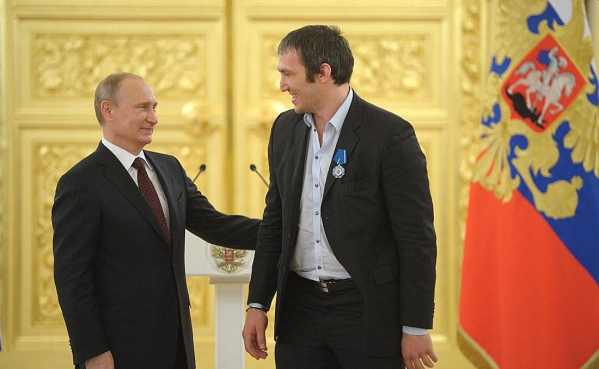The Russia Problem Isn’t New to World Sport
The Ice Hockey World Championships will start on May 13th 2022 in Tampere and Helsinki in Finland. Russia will not be seen at the tournament, and the return to the international ice hockey arenas is not even in sight. U.S. hockey historian Bruce Berglund explains why. He also wonders what is wrong with Russian sports as a whole.

Ovechkin with Vladimir Putin during an award ceremony for the Russian national ice hockey team at the Grand Kremlin Palace, 2014. Picture: Wikipedia.
Shto delat? What to do?
The question is an important one in Russian history. In the 19th century, reformers and revolutionaries asked what to do about the Russian empire's inequality and repression. “What are we to do for Russia?” they asked.
Today, the world is asking: What do we do with Russia?
This question has pressed upon the governing bodies of world sport since Russia invaded Ukraine in February. The immediate answer has been to ban Russian athletes from international competitions and move events from Russia. Teams representing Russia and its sole ally, Belarus, will not participate in the IIHF World Championship in Finland. And the IIHF announced on April 26 that St Petersburg will not host the 2023 World Championship.
But what about the long term? At some point in the future, fighting in Ukraine will cease. There will even come a time when Vladimir Putin no longer rules in Moscow. Will Russia then be restored to full participation in international sports?
The answer is not straightforward. International sports––and international hockey––have long had a Russia problem. If they do not address this difficult history, the IIHF and other governing bodies risk repeating the same mistakes and undermining world sport.
Since Putin and his supporters have been reclaiming the legacy of the Soviet Union, we can likewise examine this Russia problem by looking at the Soviets’ role in world sport. When Moscow decided to compete in international events after World War II, the IOC and other federations debated whether the Soviets would abide by the rules. Some IOC members insisted, however, that participation in the Olympics would have a positive effect on the Soviets. They would learn to follow the norms of world sport. The Soviets were admitted to the IOC and first participated in the 1952 Helsinki Games.
Needless to say, the Soviets didn’t learn to follow the norms of world sport, particularly the rules on amateurism. The Soviet government paid athletes to train and compete, while claiming they were amateurs.
Soviet state professionalism was especially a thorn in international hockey. Beginning with the first Olympic tournament in 1920 and the start of the annual world championship in 1930, world hockey's governing body followed the IOC’s amateur rules. Soviet dominance in the 1960s and 70s was due largely to their success in gaming this system. In Finland and Sweden, hockey officials recognized they had to adapt to keep up with the Soviets. Professionalism crept into Nordic hockey to enable players more time to train. Meanwhile, Canadian officials lodged complaint after complaint. They pointed out the unfairness of a system that allowed the Soviets’ fake amateurs to compete but excluded Canadian pros.
The state professional ruse came to an end with the fall of the Soviet Union. But the cheating continued. If Russian skaters had competed at this year's World Championship, they would not have been representing the country of Russia, officially at least. The hockey team and other Russian athletes remain under penalties set down by the World Anti-Doping Agency in 2019. The action by WADA followed a decade of investigations into Russia’s systematic program of doping. Since 2002, forty-four Olympic medals have been stripped from Russian athletes, far more than any other country.
Just as Moscow rebuked questions about the Soviet state-professional system as being politically motivated, Russian officials have also condemned the doping punishment as “anti-Russia hysteria” or an American-led conspiracy. Likewise, Russian officials have protested the bans imposed since the invasion of Ukraine as an unfair politicization of sports.
In fact, it has been Russia that has used sports deliberately and cynically for political ends. By hosting major events such as the 2014 Winter Olympics, the 2018 World Cup, and the IIHF World Championship in 2007 and 2016, Vladimir Putin's regime sought to present an image of Russia as a reliable member of the international community. “The decision shows that Russia is trusted,” Putin said in 2010 when FIFA announced his country would host the World Cup. Leaders of world governing bodies, especially former IIHF president René Fasel, were willing partners in Putin's efforts to “sportswash” his regime's authoritarian policies at home and military aggression abroad.
Putin has also used the international success of Russian athletes to bolster his authority. The pro-war rally held at Moscow’s Luzhniki Stadium in March featured Russian medalists at the recent Tokyo and Beijing Olympics. Alexander Ovechkin took part in a publicity campaign supporting the initial Russian invasion of the Donbas region in 2014. Even though he asked for “no more war” in his only public statement since the current invasion, Ovechkin's Instagram account still features a photo of him and Putin.
This linking of hockey, nationalism, and politics was evident during the 2018 Winter Olympics. At the arena in Korea, I saw Russian fans with hammer-and-sickle flags, banners with Stalin's face, and Russian team jerseys with Putin's name on the back. Both Putin and Stalin also made appearances on social media when the Russians beat Germany for the gold medal. Memes on Twitter cast the hockey win as a repeat of the Red Army’s victory in the Great Patriotic War as well as a humiliation for the United States.
In recent weeks, since the invasion of Ukraine, Russian sports sites have expressed support of Putin and venom toward the Americans. The accomplishments of Ovechkin and other Russian players in the NHL are cheered as proof of Russian greatness. In the words of Dmitry Shivchev, chair of the Duma’s sport committee, “It’s clear that there is demand for our guys. It’s impossible to get rid of them. They represent the backbone of the NHL.”
At the same time, ironically, Russia's banishment from other competitions is also celebrated. After the IIHF withdrew the 2023 World Championship from St. Petersburg, Duma member Vitaly Dimonov told Sports.ru that Russia should start its own tournament while “teams of vegans and queers” would play in the supposedly American-run tournament. “Let the others play in the place where they will be assigned by the Americans, together with transgender people. And we will have a normal championship”, said Dimonov.
The link between hockey and politics in Putin’s Russia has been most evident when the president himself steps onto the ice. For several years, Putin played in a charity hockey game coinciding with the country's Victory Day celebrations. Joined on the ice by former NHL players and Soviet greats like Slava Fetisov, Putin scored a half-dozen goals or more in these games, even though he is a shaky skater.
For fans in Finland or the United States, these performances were ridiculous: former gold medalists and Stanley Cup champions allowing their stumbling president to score goal after goal. But for Putin’s supporters, this is a show of the leader’s strength. “He’s got a good shot. He understands the game,” said Fetisov in a 2018 interview. “This is unteachable.” A former Minister of Sport and Putin appointee to the Russian Senate, who is now on international sanctions lists, Fetisov praised Putin’s hockey feats without irony: “This is one of the most unique examples in the history of big politicians, to show they can play the hardest possible sport.” The remark reveals a fundamental truth about Russia’s involvement in world sport: even if the game is rigged, all that matters is the result. Wins are more important than a fair contest.
Russia has cheated at sports and flouted the rules of international competition. Yet many of us still hope, like IOC officials 70 years ago, that the Russians will play fair. Hockey fans want a tournament that includes stars like Kirill Kaprizov, Nikita Kucherov, and Igor Shesterkin. Yet, contrary to the NHL’s insistence that Russian players represent only their clubs, their accomplishments on the ice do have political meaning. As Duma member Dmitry Shichev said, “These guys are really the pride of all our Russian people.” The argument that Russian hockey players are just hockey players is false. All Russian athletes are political symbols––they have been for decades.
So, what to do with the Russian athlete? What we cannot do is restore Russia to international competition without taking account of the cheating and deception. We cannot restore Russia without acknowledging that many of its athletes, including hockey players, have been vocal supporters of a criminal, authoritarian regime. The invasion of Ukraine must bring a change in how the world engages with Russia politically and economically. And it must also bring a change in world sport.
Bruce Berglund
Bruce Berglund is a historian and writer. He did research in Europe, Asia, and North America for his book, The Fastest Game in the World: Hockey and the Globalization of Sports (University of California Press, 2021). He lives in Minnesota. Follow him on Twitter at @brberglund.
Yle News looks ahead to the upcoming ice hockey world finals to be hosted in Helsinki and Tampere. Berglund comments, starting at 15:35: APN podcast: All points Nato | News | Yle Uutiset.
